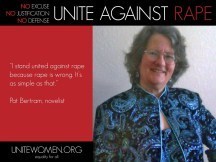Pat Bertram's Blog, page 221
September 24, 2013
Happy Bloggiversary To Me!
I created this blog exactly six years ago today, back when I hadn’t yet become a published author, back when I didn’t even know what a blog was. I’d read how important blogging was for authors, both as a way of getting known and as a way of connecting with readers, so I decided to “act as if” I were going to be published in the hopes of making it happen. I had nothing to say, no one to say it to, no reason to say anything, but I didn’t let that stop me. I started blogging on September 24, 2007, and haven’t stopped since.
Did acting as if I were goin g to get published work? Perhaps, though there is no direct connection that I know of. Still, one and a half years after starting this blog, my first two books were published by Second Wind Publishing. They have now published five of my books — four suspense novels and one non-fiction book about grief. More importantly — at least blog-wise — I am still blogging, still making connections, still making friends. Still having fun.
g to get published work? Perhaps, though there is no direct connection that I know of. Still, one and a half years after starting this blog, my first two books were published by Second Wind Publishing. They have now published five of my books — four suspense novels and one non-fiction book about grief. More importantly — at least blog-wise — I am still blogging, still making connections, still making friends. Still having fun.
One thing I never expected when I set up Bertram’s Blog, is how much I would like writing and publishing my articles. I feel safe here, away from the constant promos, ideological ravings, and mindless ratings on other sites, and it gives me the freedom to say what I want, no matter how personal. Three and a half years ago, my life mate/soul mate died, and his death catapulted me into such a world of such pain that it bled over into my posts. This blog became a place where I could try to make sense of what I was going through, to offer comfort and be comforted, to find my way to renewed life.
It’s nice to know that whatever life throws at me, whatever problems I encounter, whatever challenges come my way, this blog will be here for me.
Although I’d planned to post every day, during the first four years I only managed to blog three or four times a week, but exactly two years ago today, I made a 100-day commitment to post a daily blog, and I continued to post every day once that initial commitment was fulfilled. (Which makes this a double anniversary — 6 years for blogging, 2 years for daily blogging.)
It amazes me that anyone wants to read anything that I write here. This is so much a place for just letting my thoughts roam, for thinking through problems, and (I admit it) for pontificating a bit. It’s been a kick, writing this blog, and I want to thank all of you for indulging my whims and whimseys.
Thank you for reading. Thank you all for your comments, your likes, your support. They have meant more to me (especially this past three and a half years) than you can ever imagine.
***
Pat Bertram is the author of the suspense novels Light Bringer, More Deaths Than One, A Spark of Heavenly Fire, and Daughter Am I. Bertram is also the author of Grief: The Great Yearning, “an exquisite book, wrenching to read, and at the same time full of profound truths.” Connect with Pat on Google+. Like Pat on Facebook.
Tagged: acting as if, blogging, bloggiversary, daily blogging, grief and blogging, postaday, Second Wind Publishing


September 23, 2013
Feeling Like a Celebrity
Have you ever met one of those lonely old people who are willing to talk to anyone who happens to wander into their life? They don’t care if you had the wrong address and knocked on their door by mistake. They still ask you to come in, stay and chat awhile, have a glass of fresh-squeezed lemonade or a plate of homemade cookies.
 Usually people find their way to this blog by googling such topics as things your mother should have told you, three on a match, describing a scene in an interesting way, or my soul mate died, but sometimes they find there way here fthrough topics that have nothing to do with this blog such as sex with sister tips. However people find their way here, I’m glad they came knocking on my blog’s door. I just wish I had some lemonade to offer them, or a plate of fresh-baked cookies. Probably would get more traffic if I did, but I have yet to figure out how to send such goodies through cyberspace.
Usually people find their way to this blog by googling such topics as things your mother should have told you, three on a match, describing a scene in an interesting way, or my soul mate died, but sometimes they find there way here fthrough topics that have nothing to do with this blog such as sex with sister tips. However people find their way here, I’m glad they came knocking on my blog’s door. I just wish I had some lemonade to offer them, or a plate of fresh-baked cookies. Probably would get more traffic if I did, but I have yet to figure out how to send such goodies through cyberspace.
Even better than having people stop by to read something I wrote is when they leave a comment. Getting comments from strangers makes me feel like a celebrity. A person I had never met read what I wrote, and liked it enough to tell me so. Wow!
In the end isn’t that what we’re all looking for, whether we’re young or old, lonely or befriended? Aren’t we all looking for someone to acknowledge us? Someone to see us as apart from all the other billions of people in the world, even if only for a moment? We writers and bloggers spew out billions, trillions of sentences each day, and every single one of them says the same thing: “Notice ME.”
Well, when someone leaves a comment, it tells me that for a single blip of time, I was noticed.
***
Pat Bertram is the author of the suspense novels Light Bringer, More Deaths Than One, A Spark of Heavenly Fire, and Daughter Am I. Bertram is also the author of Grief: The Great Yearning, “an exquisite book, wrenching to read, and at the same time full of profound truths.” Connect with Pat on Google+. Like Pat on Facebook.
Tagged: blog, comments, gingersnaps, lemonade, lonely, Omar Khayyam. The moving finger writes


September 22, 2013
I Am a Guest on the UniteWomen.Org Blog!
A couple of weeks ago I asked for help in finding a topic for a guest blog for UniteWomen, a national non-partisan grassroots organization, whose mission is to end inequality for women that stems from prejudice and discrimination and to defend and advance the human and civil rights of women and girls.
 I narrowed the wonderful suggestions down to two since more than one person suggested each of the topics. One suggestion was to write about the compassion of strangers during grief . The other suggestion was to expand what I had written in Help! I Need a Guest Blog Topic. (I’d written: Oddly, I’ve never felt disempowered as a women, perhaps because I seldom define myself by gender, religion, nationality, age, or any other consideration. I am simply . . . a being in flux. I have felt powerless at times, but not because of being a woman. The powerlessness came from being in situations greater than my abilities. Sometimes I developed the necessary abilities, other times I simply endured. Either way, somehow I moved beyond the powerlessness and here I am — still strong, still developing my abilities, still learning to empower myself.)
I narrowed the wonderful suggestions down to two since more than one person suggested each of the topics. One suggestion was to write about the compassion of strangers during grief . The other suggestion was to expand what I had written in Help! I Need a Guest Blog Topic. (I’d written: Oddly, I’ve never felt disempowered as a women, perhaps because I seldom define myself by gender, religion, nationality, age, or any other consideration. I am simply . . . a being in flux. I have felt powerless at times, but not because of being a woman. The powerlessness came from being in situations greater than my abilities. Sometimes I developed the necessary abilities, other times I simply endured. Either way, somehow I moved beyond the powerlessness and here I am — still strong, still developing my abilities, still learning to empower myself.)
I wrote both posts and let UniteWomen choose which one they wanted. They chose the one about the compassion of strangers. The blog has now been posted and you can see it here: ”Comfort In the Company of Strangers.”
The other article, I posted on this blog. You can see it here: Grief and the Loss of Identity.
A big thank you to everyone who suggested topics! Even if I didn’t use your topic, I’m still planning on someday writing the posts you suggested. They were all great topics.
***
Pat Bertram is the author of the suspense novels Light Bringer, More Deaths Than One, A Spark of Heavenly Fire, and Daughter Am I. Bertram is also the author of Grief: The Great Yearning, “an exquisite book, wrenching to read, and at the same time full of profound truths.” Follow Pat on Google+. Like Pat on Facebook.
Tagged: blog topic, empowering women, gender equality, guest blog, identity as a woman, UniteWomen.org


September 21, 2013
Today is World Gratitude Day
World Gratitude Day supposedly began in 1965 at a Thanksgiving dinner in Hawaii hosted by spiritual teacher and author Sri Chinmoy. The guests pledged to celebrate their blessings in their own nations each September 21st. In 1977, the United Nations Meditation Group initiated World Gratitude Day on a global level. World Gratitude Day is described as a:
“holiday for all peoples, a day of meditation for all religions, a day of celebration for all humanity, united by knowledge of simultaneously shared emotion, a day when triumph of the spirit can make a world community.”
Today I am grateful for this World Gratitude Day. It’s good to have a second day to remind me to be grateful, but even without the reminders of the USA Thanksgiving or the UN World Gratitude Day, I often find myself being grateful for the small pleasures of life — a walk, a good meal, a new insight. Lately, I’ve been finding myself grateful for bigger gifts — a body that usually does what I need it to do, a place to stay, people to visit with both online and offline. And, of course, I’m grateful for what I once had — a deeply commited love, someone with whom I could always be myself, someone to help me become who I am today.
I am especially grateful to have a place where I can post blogitorials such as this one, and even more grateful that sometimes people stop by and read what I have to say. So thank you for celebrating this day with me. I am grateful to all of you.
***
Pat Bertram is the author of the suspense novels Light Bringer, More Deaths Than One, A Spark of Heavenly Fire, and Daughter Am I. Bertram is also the author of Grief: The Great Yearning, “an exquisite book, wrenching to read, and at the same time full of profound truths.” Connect with Pat on Google+. Like Pat on Facebook.
Tagged: being grateful, being thankful, blogitorial, grateful for small pleasures, Sri Chinmoy, World Gratitude Day


September 20, 2013
Echoes
Writers need to watch out for echoes — a duplication of words, phrases, effects, details, scenes that reverberate in readers’ minds and dilute the work. As an example: originally I’d written the first sentence of this blog as “Writers need to watch out for echoes — a duplication of words, phrases, effects, details that echo in readers’ minds and dilute the work,” but the second “echo” echoed the first and diluted the effect of both, so I changed the second “echo” to “reverberate.” In the same way, if you have two scenes that make the same point without adding anything new, then the scene is not only redundant, but echoes in readers’ minds, and makes them feel as if the story is going nowhere.
Sometimes, however, an echo can be used to good effect in writing, such as when you’re trying to play on a theme, but it’s especially effective in photography. A roof can be an interesting subject for an image, but showing the roof against an analogous background — peaks against peaks — can strengthen the image rather than dilute it.
There is no shortage of peaks around here — roof peaks, mountain peaks, hill peaks — and I was able to find shots of peaks perfectly echoed against peaks to illustrate my point.









***
Pat Bertram is the author of the suspense novels Light Bringer, More Deaths Than One, A Spark of Heavenly Fire, and Daughter Am I. Bertram is also the author of Grief: The Great Yearning, “an exquisite book, wrenching to read, and at the same time full of profound truths.” Connect with Pat on Google+. Like Pat on Facebook.
Tagged: comparison, desert, echoes in photography, echoes in writing, mountains, Nature, peaks, photos, roofs


September 19, 2013
Help Prevent the Disappearance Of Native American Languages
Deborah J Ledford, an award-winning author and one of my very first online (and later offline) friends, has come up with an innovative way to finance her next project. IOF Productions Ltd. established the NatAmGoGo crowd funding campaign on Indiegogo to produce and distribute the audiobook version of her latest thriller novel, Crescendo from Second Wind Publishing.
The NatAmGoGo campaign will also benefit The Blue Feather Corporation, a Native American language and culture nonprofit organization.
The professional audiobook presentation of Crescendo will be narrated by TV and film actress Christina Cox, who has appeared in a variety of films and television episodes including NCIS, Dexter, 24, Castle, Chronicles of Riddick, Better Than Chocolate and Nikki & Nora. IOF Productions Ltd will record Crescendo in November at Costa Mesa Studios in Southern California for download and to purchase as CDs for a December 2013 release.
 “We are thrilled to have Christina Cox set to perform Crescendo. Her exquisite voice and acting prowess will truly bring my words to life,” Ledford says. “The audiobook will be recorded by an experienced staff, with the quality that will equal narrated books presented by top publishing houses.”
“We are thrilled to have Christina Cox set to perform Crescendo. Her exquisite voice and acting prowess will truly bring my words to life,” Ledford says. “The audiobook will be recorded by an experienced staff, with the quality that will equal narrated books presented by top publishing houses.”
Contributor packages for the Indiegogo/ NatAmGoGo project include a PDF version of Staccato, the first book in the Steven Hawk/Inola Walela mystery series; autographed poster of the Crescendo audiobook cover signed by Christina Cox and Ledford; print versions of book series, including Staccato, Snare and Crescendo, signed and personalized by the author; a leather bound package containing all discs of the Crescendo audiobook with booklet signed by Cox and Ledford; a full content edit by Ledford of a manuscript up to 90,000 words, and hand-crafted jewelry created by a renowned Navajo, Hopi and Taos Pueblo artists.
Ledford spent her summers growing up in the Great Smoky Mountains of western North Carolina, where her novels are set. She met Floyd “Mountain Walking Cane” Gomez in 2006 while doing research for her award-winning novel, Snare. Several years later, Floyd expressed the need to protect languages and culture on reservations throughout the United States, which is why he is establishing the Blue Feather Corporation.
“The storytelling campaign is an effort to prevent the disappearance of Native American languages and culture,” says Arizona author Ledford, who is part Eastern Band Cherokee.
“Native tribal languages and ancient ways are dying on our nation’s reservations,” Ledford explains. “We want to ensure that ancient societies survive.”
The Native American nonprofit foundation will receive 50% of the royalties from downloads and sales of the Crescendo audiobook. “But once the funding goal is reached, any excess will benefit the foundation 100 percent,” Ledford adds. “We can’t let another language or culture disappear,” Ledford concludes. “‘Wado,’ which means ‘thank you’ in Cherokee.”
Tagged: Crescendo, Deborah J. Ledford, Indiegogo, IOF Productions Ltd, NatAmGoGo, The Blue Feather Corporation


September 18, 2013
Creating the Fictional Town of Chalcedony
I needed a special setting for my latest novel Light Bringer. It needed to be part of the world but isolated, a place where people were free to be themselves without ridicule, where UFOs sightings could have had a major impact, where a secret government-sanctioned project could be hidden. Luckily, I had to look no further than out my living room window.
At the time, I was living in the shadow of the Grand Mesa, in ranching country, and much of that terrain formed the backdrop of my story. Chalcedony is the name of a fictional county sandwiched between Mesa County and Delta County. It is a beautiful place with mountains and valleys, wide-open spaces, cattle and horses, new buildings and old.
But beneath the mountains in this peaceful fictional world, unpeaceful things are happening.

Grand Mesa (The view from my living room window)
~~~

Calcedony County
~~~

Road Into Chalcedony
~~~

Mountain View
~~~

Another view of Grand Mesa
~~~

Chalcedony County
~~~

Luke’s Ranch
~~~

Pasture Gate
~~~

Ranch House in Chacedony
~~~

What lurks beneath these mountains? Read Light Bringer, and find out!
~~~
 Light Bringer: Becka Johnson had been abandoned on the doorstep of a remote cabin in Chalcedony, Colorado when she was a baby. Now, thirty-seven years later, she has returned to Chalcedony to discover her identity, but she only finds more questions. Who has been looking for her all those years? Why are those same people interested in fellow newcomer Philip Hansen? Who is Philip, and why does her body sing in harmony with his? And what do either of them have to do with a shadow corporation that once operated a secret underground installation in the area?
Light Bringer: Becka Johnson had been abandoned on the doorstep of a remote cabin in Chalcedony, Colorado when she was a baby. Now, thirty-seven years later, she has returned to Chalcedony to discover her identity, but she only finds more questions. Who has been looking for her all those years? Why are those same people interested in fellow newcomer Philip Hansen? Who is Philip, and why does her body sing in harmony with his? And what do either of them have to do with a shadow corporation that once operated a secret underground installation in the area?Click here to read the first chapter of: Light Bringer
***
Pat Bertram is the author of the suspense novels Light Bringer, More Deaths Than One, A Spark of Heavenly Fire, and Daughter Am I. Bertram is also the author of Grief: The Great Yearning, “an exquisite book, wrenching to read, and at the same time full of profound truths.” Connect with Pat on Google+. Like Pat on Facebook.
Tagged: conspiracy, fiction, Grand Mesa, mounains, mystery, novel, thriller, UFOs


September 17, 2013
Grief: Losing Your Grip
There are so many facets and phases to profound grief that even now — three and a half years after the death of my life mate/soul mate — I am still bewildered by some of the symptoms I experienced.
I always assumed “losing your grip” was merely a euphemism for losing your ability to deal with life, but shortly after the onset of grief, I lost my grip. My real grip, not my euphemistic grip. (Well, I lost both, but the second went with the territory.)
I dropped silverware, glasses, cups, plates — just about everything slipped through my fingers. I didn’t particularly notice it at first — I have been known to drop things — but after I moved to a house with hard tile floors, the loss of my grip became explosively apparent. My first night here, I dropped a glass, and it shattered on the hard floor. It sounded like a shot, scaring both me and my 96-year-old father. When the same thing happened a few days l ater — a mug this time — I realized I had to be careful or I’d give him (and me!) a heart attack. For over a year, I had to make sure of my grip before I lifted something so that it wouldn’t slip from my fingers. My grip gradually tightened, and after two years, I noticed I no longer had to pay attention to how I held something — I was automatically getting a grip.
ater — a mug this time — I realized I had to be careful or I’d give him (and me!) a heart attack. For over a year, I had to make sure of my grip before I lifted something so that it wouldn’t slip from my fingers. My grip gradually tightened, and after two years, I noticed I no longer had to pay attention to how I held something — I was automatically getting a grip.
Obviously, the phrase “lost my grip,” meaning losing your ability to handle a situation, had to come from somewhere, and I have a hunch that it came from the very thing I experienced.
I spent the past couple of hours researching this subject but never found a clinical reason for losing my grip. The weak hands didn’t come from any sort of illness. Not lupus, carpal tunnel syndrome, multiple sclerosis or any of the other 57 medical conditions where people can lose their grip. Nor was it an effect of aging or poor muscle control since the loss of grip came on so rapidly and gradually disappeared without any change of circumstances except the onset and gradual waning of grief.
It’s possible low blood sugar caused the loss of grip in the beginning because I wasn’t eating much, but as the year progressed, I ate more normally and the symptom persisited. Or maybe losing one’s grip is a symptom of emotional shock (rather than physical shock). Or maybe it represented a general enervation from from all the stress. The loss of a mate ranks as one of the most stressful conditions a person can suffer, which is why the death rate for those in the first year of profound grief is so high. Or it could be a physical manifestation of the metaphoric state — grief certainly makes you feel as if you’re losing your grip. In my case, It also seemed to be a reflection of my ability to connect, as if when I lost the connection with him, I lost the ability to connect with anything.
Well, now that I’m nearing what I call the half-life of grief, I’ve regained both my grip (my ability to grasp things) and my grip (my ability to handle life). I’ve also regained my ability to connect — with things and people.
And so grief continues to wane.
***
Pat Bertram is the author of the suspense novels Light Bringer, More Deaths Than One, A Spark of Heavenly Fire, and Daughter Am I. Bertram is also the author of Grief: The Great Yearning, “an exquisite book, wrenching to read, and at the same time full of profound truths.” Connect with Pat on Google+. Like Pat on Facebook.
Tagged: can't get a grip, death, getting a grip on grief, losing my grip, losing your grip, loss, why do you lose your grip


September 16, 2013
Rubicon Ranch: Secrets — My Newest Chapter
 Rubicon Ranch is a collaborative and innovative crime series set in the fictional desert community of Rubicon Ranch and is being written online by the authors of Second Wind Publishing.
Rubicon Ranch is a collaborative and innovative crime series set in the fictional desert community of Rubicon Ranch and is being written online by the authors of Second Wind Publishing.
In the current story, the body of a local realtor is found beneath the wheels of an inflatable figure of a Santa on a motorcycle. The realtor took great delight in ferreting out secrets, and everyone in this upscale housing development is hiding something. Could she have discovered a secret someone would kill to protect? There will be suspects galore, including a psychic, a con man, a woman trying to set up an online call-girl service, and the philandering sheriff himself. Not only is the victim someone he had an affair with, but he will also have to contend with an ex-wife who has moved back in with him and a jilted lover, both with their own reasons for wanting the realtor dead.
We hope you will enjoy seeing the story develop as we write it. Let the mystery begin! Whodunit? No one knows, not even the writers, and we won’t know until the very end! If you don’t want to miss further chapters, please go to the blog and click on “sign me up” on the right sidebar to get notifications of new chapters.
(If the Christmas theme seems unseasonal, well . . . considering how long it takes to write a book at the rate of a chapter a week, in a few months, the season will catch up to us!)
Chapter 15: Lydia Gavin
by Pat Bertram
Sunday, December 23, 5:25pm
Seth sat tall behind the desk in his tidy office, like a king receiving a subject. “What are you doing here?”
Lydia Galvin leaned back in the uncomfortable metal chair and gave the sheriff a serene smile, surprised to find that she felt no fear at facing him. “Your deputies brought me here.”
Seth glowered. “You know that’s not what I meant.”
“You want the whole story? I needed to get some groceries, so I walked up Delano Road to where I’d parked my car, and apparently your deputies found it and staked it out, because even before I could unlock the door, they jumped out of their vehicle, arrested me, and brought me here.”
“They didn’t arrest you. They just offered you a ride. I wanted to talk to you.” Seth gave Lydia one of his oh-so-familiar looks, the one that said she meant no more to him than an annoying insect.
“How did you know I was in the area?” Lydia kept her voice neutral, not wanting to seem confrontational. No point in arousing the beast in him until absolutely necessary.
“We checked out the bystanders’ videos of the burning crime scene, and there you were.” He drew in a quick breath as if upset with himself for responding. “But you’re supposed to be answering my questions. What are you doing in Rubicon Ranch?”
“Having fun. It’s quite a spectacle out there, you know.” Lydia crossed her legs, and felt a flash of satisfaction when he cut a glance at her thighs. All that running since she’d been fired had paid off—she now had the body she’d always wished for.
He remained calm, but his thinned lips and tensed shoulders told her how much that unruffled air cost him. “Why did you come to Rubicon Ranch?”
“Why do you think I came? To see what other lives you were ruining, of course. I had no intention of staying, I just wanted to check out Melanie Gray—according to the newspapers you two were quite a team—but then I met Nancy and when she let slip that you and she were sleeping together, I thought I’d hang around to see how you got out of that affair when it turned against you.” Lydia made a show of inspecting a fingernail. “I guess I’m lucky. You only ruined my career. Poor Nancy ended up in the morgue.”
“You think I killed Nancy?” Seth cocked his head like an eagle and stared at Lydia for a moment. Then he nodded. “I see. You think that by accusing me, I will assume that you’re innocent, because if you believed I killed her, then you couldn’t have.”
“Did you kill her?” Lydia waited for an answer that didn’t come. “She would have ruined you. She loved nothing but herself and power and money. She loved secrets, too, of course, but only because the secrets gave her power over people and were a source of great income. She said she used to be an actress and a model, but once when we had a few drinks, she admitted that was a front. She’d really worked as a call girl. I figured she gave up the life when she realized how much more lucrative secrets were than her body.”
Seth rose to his feet and paced the office. “You say she would have ruined me. Like you ruined me?”
Lydia forced out a small laugh. “I ruined you? No. You manipulated me. You began by treating me as if I were the most important woman in the world. You flattered me, paid attention to me, offered me words of love and the endearments I hungered for. When I was hooked, you stepped back, left me feeling bereft. And every time I spoke of leaving you, you’d pay attention to me again.” She felt tears beginning to gather behind her eyes. He doesn’t matter. Think of fire. Flames. Heat.
She drew in a deep breath, surprised Seth didn’t jump in to defend himself. He kept pacing the office as if she weren’t even there, which made it easier for her to confess. “You were my grand passion. I know you don’t believe that, but it’s the truth. I never expected you to leave your wife. I just wanted you to notice me. To put me first once in a while.”
Seth stood over her, his eyes icy as they locked onto hers. “But you turned me into the department. Said I misused my authority.”
“You did abuse your authority. I never wanted an affair with you. I had enough trouble with my husband. I didn’t need another abusive man in my life. You never knew about my husband, did you?” Lydia didn’t even try to modulate her bitter tone. “The great detective never noticed that his girlfriend had a husband who beat her. I wouldn’t have told your wife about us. Even though I threatened to tell her, I couldn’t have made our affair public. My husband would have beat me when he found out. And after you dragged your wife to my house so she could confront me, my husband did beat me. I had to go to the emergency room that time. But oh, no, everything that happened was my fault.”
“Good story,” Seth said. “Too bad none of it is true.”
“The all-wise Seth Bryan says it isn’t true, so that means it isn’t true?” Lydia shook her head sadly. “The law might be about what you can prove, but life isn’t like that. Some things are true no matter how much we don’t want to believe them.” Things like her husband’s abuse. Things like Seth’s disregard. Things like death and fire. “You men are all so blind you can’t see what’s in front of your eyes. I loved you but you threw me away, calling me a vituperative bitch. Yet Nancy, who didn’t love you at all and who truly was a vituperative bitch, you kept. But I’m through with all of you now.”
Seth sneered. “Turning into a lesbian?”
“That’s beneath even you, Seth, my love.”
“True. Perhaps the only true thing you’ve said today.” The phone rang. Seth took two long strides to the desk, and grabbed the receiver. “Yes?” A pause, then, “She’s home now? Stay there. Make sure she doesn’t leave. I’ll be there in just a few minutes.”
He hung up the phone, and turned to face Lydia.
She quirked her lips in an unamused smile. “Still on your wife’s leash? I’m surprised you haven’t killed her, too.”
“Just go,” he said wearily. “Keep my office informed of your whereabouts. We still have lots to talk about.”
Lydia rose, straightened her skirt, and settled the strap of her purse firmly on her shoulder. “There’s nothing left to say but good-bye. I didn’t kill Nancy. You did. But don’t worry, I won’t testify against you.
***
Pat Bertram is the author of the suspense novels Light Bringer, More Deaths Than One, A Spark of Heavenly Fire, and Daughter Am I. Bertram is also the author of Grief: The Great Yearning, “an exquisite book, wrenching to read, and at the same time full of profound truths.” All Bertram’s books are published by Second Wind Publishing. Connect with Pat on Google+
Tagged: mystery series collaboration, online novel, Rubicon Ranch, Rubicon Ranch Necropieces, Rubicon Ranch: Secrets, Second Wind Publishing


September 15, 2013
Life is a Matter of Habit
Life is often a matter of habit. As Aristotle said, “We are what we repeatedly do.” Actually, the whole quote is “We are what we repeatedly do. Excellence, then, is not an act, but a habit.” But this is an article about habits, not excellence.
Most of our lives are repetitive. We do the same things in the same way, eat the same foods, go to the same restaurants, see the same people, watch the same shows. It’s easy to create a habit. If we do the same thing — good or bad — often enough, the synaptic pathways in our brains get rutted, and it’s almost impossible to completely eradicate the ruts if we want to change our habits.
Recently It was easy for me to fall into the habit of playing computer solitaire for h ours on end, but now it’s almost impossible to break the habit, though I did it once, so I can do it again. (After the death of my life mate/soul mate, I mindlessly played game after game just to get through another minute, another hour of grief. A couple of years ago I broke the habit of playing games, but in a fit of restlessness a few months ago, I started in again, and now I have to rebreak myself of the habit.) The secret is to do what I need to do on the computer and then get off. Oddly, some habits are easy to break. I’m in the habit of writing a blog every day, and I keep doing it because I know if I skip a day, I’ll skip another and another, until I lose the habit of writing habitually and will only post sporadically.
ours on end, but now it’s almost impossible to break the habit, though I did it once, so I can do it again. (After the death of my life mate/soul mate, I mindlessly played game after game just to get through another minute, another hour of grief. A couple of years ago I broke the habit of playing games, but in a fit of restlessness a few months ago, I started in again, and now I have to rebreak myself of the habit.) The secret is to do what I need to do on the computer and then get off. Oddly, some habits are easy to break. I’m in the habit of writing a blog every day, and I keep doing it because I know if I skip a day, I’ll skip another and another, until I lose the habit of writing habitually and will only post sporadically.
Sometimes a change of circumstances forces us to change our habits, such as a move. When people tell me they have a hard time getting used to a new town, I suggest they go to the same place or do the same thing everyday to help themselves get acclimated. One woman who took this advice went to the same coffee shop every day, another took a walk ever day. And gradually, new comfortable ruts are built into our brains.
One of the collateral problems with grief is the instant loss of habits. In my case, we (my life mate/soul mate and I) had done most things together for decades — watched the same movies, ate the same foods, ran errands, watered the hundred or so trees we planted. As he got sicker, we put one foot in front of the other and kept on going the best we could out of habit. His death catapulted me out of the habits of my life. I still had the ruts of togetherness in my brain without someone to be together with. I also had to move from our home where we’d lived for decades to come look after my now 96-year-old father, so I didn’t even have the habits of living in the same house.
I felt as if the ground had been yanked from beneath me. When I tried to put one foot in front of the other, I’d become disoriented, as if I were falling into nothingness. I felt like such a baby, since all I could do is crawl in my alien world of no mate, no habits, nothing to connect me to the past but painful memories.
During the ensuing years of grief (in approximately two weeks, it will be three and a half years since he died) people who have been through the same sorrow have told me that grief makes a change around the four-year anniversary. That’s when many people find some sort of renewal, such as a new commitment to life.
I call this four-year mark the half-life of grief. Our cells are continuously dying and being renewed. If it takes seven years for all the cells in one’s body to be renewed, then by four years, less than half our cells will bear the imprint of our mates. And so our physical grief fades. (By physical grief, I mean the physical pain and symptoms of grief as opposed to the emotional pain.) At the same time, the ruts from the habits of our old life have evened out, and we have developed new patterns of living, new habits, new ruts. And as we repeatedly do new things alone, we become persons who can survive — and even thrive — without our mates because in the end, despite love and grief, learning and yearning, life is a matter of habit.
***
Pat Bertram is the author of the suspense novels Light Bringer, More Deaths Than One, A Spark of Heavenly Fire, and Daughter Am I. Bertram is also the author of Grief: The Great Yearning, “an exquisite book, wrenching to read, and at the same time full of profound truths.” Connect with Pat on Google+. Like Pat on Facebook.
Tagged: addicted to games, Aristotle, creating habits, four years of grief, life is habit, loss of a soul mate, three and a half years of grief






